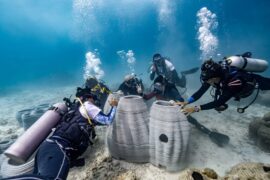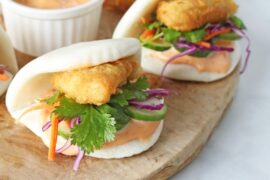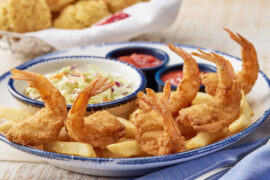Thai Union Group PCL celebrated its 40th anniversary with a two-day exhibition at Siam Paragon’s Royal Paragon Hall in Bangkok on November 28 and 29. An elaborate exhibit featuring the seafood company’s historical milestones traced its journey over the past four decades for all attendees to witness, including a showcase of key recent sustainable development and innovation initiatives.
“It has been a remarkable 40 years for our company, full of tremendous achievements. We have fully embraced our role as a leading agent for change,” said CEO Thiraphong Chansiri. “That is particularly true of our recent efforts in sustainability and innovation. When I reflect on these accomplishments, I often recall the old saying that we do not inherit the earth from our ancestors; we borrow it from our children.”
From its humble beginnings in 1977, Thai Union has grown to become the world’s largest producer of shelf-stable tuna and a major supplier of frozen farm-raised shrimp and salmon products. Employing a global workforce of over 46,000 people, it rang up sales exceeding THB 125 billion (US$ 3.7 billion) last year, of which 70% was generated in the USA and Europe.
The company’s brand portfolio includes Chicken of the Sea, John West, Petit Navire, Parmentier, Mareblu, King Oscar, and Rügen Fisch, SEALECT, Fisho, Bellotta and Marvo. In addition, it has a 25% ownership stake in Orlando, Florida-headquartered Red Lobster, the world’s largest seafood restaurant chain.
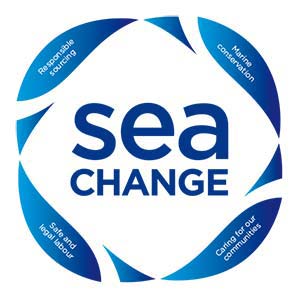 Thai Union’s sustainability strategy, SeaChange, was launched in 2016 as a program designed to cover every aspect of the seafood business: from how the company looks after the oceans to how it manages waste, to its responsibility for workers, and building brighter futures for the people and communities in which the company operates.
Thai Union’s sustainability strategy, SeaChange, was launched in 2016 as a program designed to cover every aspect of the seafood business: from how the company looks after the oceans to how it manages waste, to its responsibility for workers, and building brighter futures for the people and communities in which the company operates.
“Traceability is the backbone of our sustainability strategy,” said Dr. Darian McBain, the Thai Union’s global director for sustainable development. “When it comes to sustainability, the key is the ability to fully trace seafood – from catch to consumption. With full traceability in place, we will be able to identify, investigate and improve key issues such as labor and sourcing.”
In December 2016, in line with SeaChange, the company made a global tuna commitment to sourcing 100% of its branded tuna from fisheries that are either certified by the Marine Stewardship Council (MSC) or engaged in Fishery Improvement Projects (FIPs) to move them toward MSC certification. As part of the commitment, it is investing US $90 million in initiatives, including 11 new FIPs, which will increase the supply of sustainable tuna.
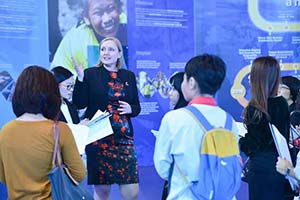 Dr. Darian McBain, Thai Union’s global director for sustainable development, guides visitors through the exhibition.Building upon SeaChange, Thai Union entered into a joint agreement in July with Greenpeace to commit to more sustainable, socially responsible seafood – acknowledging a shared vision for healthy seas now and for future generations. In June, at a World Economic Forum (WEF) meeting in New York City, the company committed to the WEF’s Tuna 2020 Traceability Declaration, which supports the United Nations Sustainable Development Goals (SDGs). It also signed a pledge as part of its membership in the Seafood Business for Ocean Stewardship, committing to improve operations as well as challenge the rest of the seafood industry to follow, all with the goal of helping the world achieve the SDGs.
Dr. Darian McBain, Thai Union’s global director for sustainable development, guides visitors through the exhibition.Building upon SeaChange, Thai Union entered into a joint agreement in July with Greenpeace to commit to more sustainable, socially responsible seafood – acknowledging a shared vision for healthy seas now and for future generations. In June, at a World Economic Forum (WEF) meeting in New York City, the company committed to the WEF’s Tuna 2020 Traceability Declaration, which supports the United Nations Sustainable Development Goals (SDGs). It also signed a pledge as part of its membership in the Seafood Business for Ocean Stewardship, committing to improve operations as well as challenge the rest of the seafood industry to follow, all with the goal of helping the world achieve the SDGs.
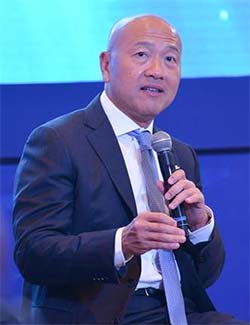 “We’re very committed to invest in innovation” and “execute our SeaChange sustainability strategy,” assures Thai Union CEO Thiraphong Chansiri.“Thai Union looks forward to continuing to execute our SeaChange sustainability strategy, strengthened and enhanced by the joint agreement with Greenpeace, along with our other collaborations, to work toward healthy seas,” said Chansiri.
“We’re very committed to invest in innovation” and “execute our SeaChange sustainability strategy,” assures Thai Union CEO Thiraphong Chansiri.“Thai Union looks forward to continuing to execute our SeaChange sustainability strategy, strengthened and enhanced by the joint agreement with Greenpeace, along with our other collaborations, to work toward healthy seas,” said Chansiri.
Focus on Future Innovation
The 40th anniversary exhibit also demonstrated Thai Union’s clear focus on the importance of innovation in the future. In 2015, the company established its Global Innovation Incubator (Gii), making a THB 900 million investment in innovation.
In collaboration with Mahidol University, Gii supports researchers initiating and enhancing new areas of food research and technology. It develops and enhances seafood products, packaging and processing to add more value to Thai Union’s business and serve growing customer demands and nutritional needs.
Additionally, Gii is developing marine ingredients that maximize use of raw materials to create important human nutrient ingredients used in a variety of categories. This includes nutraceuticals from highly refined tuna oil with Omega 3 DHA, critical to infant health and cognitive development.
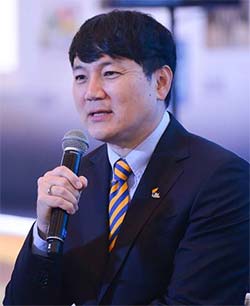 Innovation will play a bigger role in Thai Union’s business in the future, as the company looks to achieve a goal of US $8 billion in annual revenues by 2020, says Dr. Tunyawat Kasemsuwan, global innovation director.“We’re very committed to invest in innovation as it will help us deliver what consumers want now, and what they will want, and need, in the future,” Chansiri stated.
Innovation will play a bigger role in Thai Union’s business in the future, as the company looks to achieve a goal of US $8 billion in annual revenues by 2020, says Dr. Tunyawat Kasemsuwan, global innovation director.“We’re very committed to invest in innovation as it will help us deliver what consumers want now, and what they will want, and need, in the future,” Chansiri stated.
By 2020, innovation will play a bigger role in Thai Union’s business and is expected to contribute 10% of the company’s total sales projected at US $8 billion, said Dr. Tunyawat Kasemsuwan, global innovation director at Thai Union.
“Looking forward, we will continue to make progress and use our leadership position and collective strengths to face down and resolve the challenges that confront us,” said Chansiri. “I take great solace in the belief that we have the right people in the right places, poised to do our part in future generations. We look forward to the next 40 years.”


